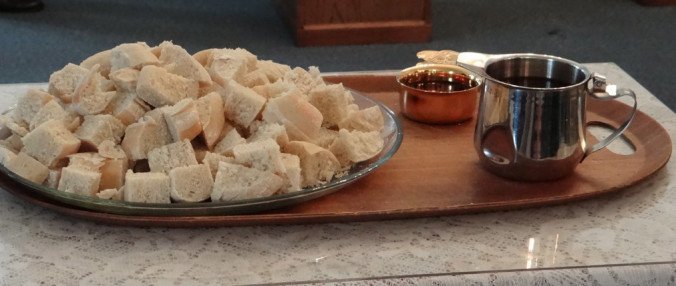If you ever visited an Orthodox church and witnessed the Mystery of Holy Communion, you probably noticed a basket filled with leavened bread. Parishioners may have taken some, dunked it in some wine, and taken it back to their seats. They might even have taken a piece and handed it to someone who didn’t go up to receive Communion. In this post, we explain the etiquette and proper use of this blessed bread, or antidoron.
Estimated reading time: 3 minutes
What is blessed bread?
During every Divine Liturgy, the Orthodox (and Roman Catholics who celebrate the Byzantine Rite) distribute blessed bread after Holy Communion. This bread comes from a loaf called the prosphora (Gr. “offering”), which is stamped with a seal that says, “IC XC NIKA,” (Jesus Christ Conquers). The part with the seal is called the Lamb. The priest cuts out the Lamb during a part of the Liturgy called the Proskomedia. So, the blessed bread, or antidoron (Gr. “instead of the gifts”), is what remains of the loaf after the Lamb is removed and consecrated.
Keep Reading: Guide To Baking Prosphora
The priest blesses the antidoron during the singing of the hymn to the Theotokos (Mother of God) and usually distributes what remains of it at the end of the Divine Liturgy to all present in the congregation.
Partaking of Antidoron
In some Orthodox churches, like ours, the priest distributes the blessed bread to everyone, even those who are non-Orthodox. Moreover, he blesses each person who approaches to receive it. In other jurisdictions, the antidoron is reserved for the faithful only, the same as Holy Communion.
Related: Why Do Orthodox Churches Use Leavened Bread For Communion?
Typically, we receive blessed bread immediately after the Eucharist and/or after venerating the cross and receiving a blessing from the priest at the end of the Divine Liturgy. We do this to cleanse our palates after receiving the Body and Blood of Christ in the Eucharist, to prepare our bodies to once again eat earthly food. Because the antidoron is blessed, we must be mindful when handling it:
- Take care not to allow crumbs to drop to the floor.
If this happens, gather the crumbs together. You can either burn them or scatter them outdoors for the elements and animals to consume. - Assist children and make sure they only take one or two pieces.
- Consume the bread slowly, mindful of what it is and of the benefit you receive from God for partaking of it.
For those who are Orthodox, we should only ever receive Holy Communion or partake of blessed bread after doing our utmost to fast from midnight the night before. In other words, the Eucharist and/or antidoron should ideally be the first food and drink to touch your lips in the morning. If you did not fast for whatever reason, you can always take the antidoron home with you and partake of it another morning. Traditionally, Orthodox Christians would take enough pieces home with them to break the fast each morning throughout the week. After their morning prayers, they would partake of the antidoron and some holy water, and then begin their day. What a beautiful way to begin each morning!
Conclusion
To sum up here, the antidoron is the blessed bread that remains after the priest removes the Lamb from the prosphora. We typically receive this blessed bread at the end of Liturgy. Depending on your parish and jurisdiction, the practice of distributing the antidoron to non-Orthodox might differ. Regardless, we should always take care when handling this blessed bread and mindfully consume it, realizing what it is and being thankful for having received it.
Read More: Church Etiquette: The Ultimate Guide


One Response
This post was interesting. I was fortunate enough to have my yiayia live next door. She taught me very early about the proper handling of the antidoron. Every tiny crumb we didn’t eat, was held tightly in my hand to sprinkle in the grass at home for the birds. She wouldn’t even let us sprinkle them on a paved surface.